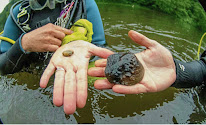Twenty-five new conservation and restoration grants totaling more than $7.4 million were awarded.
Twenty-five awards announced generated $12 million in matching contributions from the grantees, providing a total conservation impact of more than $19.4 million.
The Chesapeake WILD program aims to accelerate direct on-the-ground conservation, stewardship, and enhancements of fish and wildlife habitats and related conservation values in the Bay watershed, while also enhancing the capacity of local and regional partners to implement future on the ground actions through community-based assessment planning, design, and other technical assistance-oriented activities.
PA Projects
$1,863,300 in grants was awarded to projects in Pennsylvania--
-- Western PA Conservancy: Restoring Freshwater Mussel Communities in the West Branch Susquehanna River $411,500. Establish a partnership among state, academic and nonprofit entities to enhance freshwater mussel restoration efforts in the West Branch Susquehanna River. Project will prioritize the resilience and propagation of mussels within the watershed while improving aquatic habitat and water quality.
-- ClearWater Conservancy: Permanently Conserving Forest Habitats and Wildlife in Centre County $155,700: Permanently conserve over 250 acres of vital forest and wildlife habitat. Project will create an updated forest management plan to enhance existing young forest habitat on the property and educate local foresters and landowners about the importance of prioritizing imperiled birds and other wildlife species.
-- Ruffed Grouse Society: Utilizing Partners and Forest Management Practices to Improve Early and Late Successional Habitats Along the Kittatinny Ridge $546,500: Work with partners to apply forest management practices to benefit over 1,600 acres of habitat along the Kittatinny Ridge. Project will control invasive plants, enhance late-successional habitat characteristics, create early-successional habitats through regeneration harvests, and improve roads to better enable forest management and habitat restoration.
-- American Bird Conservancy: Creating and Enhancing a Climate Resilient Habitat Mosaic in Upper Tributary Watersheds and Forest Systems $749,600: Improve habitat conditions within two upper tributary watersheds encompassing approximately 1,400 acres in the Michaux State Forest. Project will stabilize and build resiliency in several populations of species of highest conservation concern, including eastern brook trout, timber rattlesnake and ruffed grouse.
Click Here for a complete list of grants awarded.
Reaction
The Fish and Boat Commission is pleased to announce that a conservation partnership, of which it is a member, has been awarded a National Fish and Wildlife Foundation Chesapeake Watershed Investment for Landscape Defense grant to restore freshwater mussels to the West Branch Susquehanna River (West Branch).
The grant was awarded to the Western Pennsylvania Conservancy (WPC). They and the project partners will take a comprehensive approach to mussel and river restoration through research, education, and community outreach.
In addition to WPC and PFBC, partners include the Maryland Department of Natural Resources, Commonwealth University of Pennsylvania at Lock Haven, and the Susquehanna River Basin Commission.
"Freshwater mussel communities are absolutely essential to healthy rivers and streams, and these restoration efforts are critical," said Nevin Welte, Pennsylvania's State Malacologist. "This project is an incredible opportunity to make a difference in the West Branch Susquehanna River, with each partner bringing a unique expertise to the table."
Freshwater mussels provide multiple benefits to their surrounding ecosystems but are among the most imperiled groups of native animals in North America.
A single mussel can filter up to three gallons of water per day, which is significant to water quality considering tens of thousands of mussels can live in a single mile of river.
Mussels are also an important food source for native fish and other animals including muskrats, otters, and racoons.
Unfortunately, freshwater mussel populations continue to decline due to habitat loss, pollution, and the introduction of invasive species.
Of the 53 species of freshwater mussels that remain in Pennsylvania, eleven are listed as Threatened or Endangered.
Historically, the West Branch watershed contained a thriving mussel community before the introduction of pollution associated with extensive coal mining and logging from the early 1800s through the early 1900s.
Due to enhanced regulation of these industries and conservation efforts by natural resources agencies and their partners, great strides have been made in treating legacy sources of pollution.
Improved water quality in portions of the watershed now supports recreational angling for fish species including Smallmouth Bass, Walleye, and Channel Catfish, which was unheard of as little as 40 years ago.
Beginning in 2024, the ChesWILD grant study will focus on freshwater mussel restoration upstream of the low head dam in the City of Lock Haven, Clinton County.
While mussels are plentiful in the lower West Branch from Lock Haven to the river's confluence with the Susquehanna River, they are absent upstream of the dam.
As a barrier to fish passage, the dam prevents natural mussel restoration, which occurs when larval mussels attach themselves to a fish host to disperse and complete their unique life cycle.
For this project, the team will collect mussels to serve as broodstock for hatchery operations using DNR's mobile mussel propagation trailer. This project is a component of a larger investment in mussel restoration DNR is undertaking in the watershed.
"We are incredibly excited to be awarded this grant and to collaborate with these organizations to begin working to restore freshwater mussel populations in the Susquehanna River basin," said Zach Taylor, freshwater mussel propagation biologist with the Maryland DNR. "This funding will allow thousands of individuals to be cultured, stocked, and monitored over the next three years in hopes of restoring this component of the aquatic community."
The public can assist with the project by participating in a mussel tagging event during one of the environmental education days to be held at Commonwealth University of Pennsylvania's Lock Haven campus.
There will also be hands-on opportunities for local conservation organizations and schools to participate in mussel-focused classroom programs. Details on these opportunities are currently in development and will be announced at a later date.
(Photo: TribLive.com Freshwater Mussels In Kiski River.)
[Posted: December 18, 2023] PA Environment Digest


No comments:
Post a Comment